Names in Greek mythology
Greek mythology names include the names of Gods, Heroes, Kings and smaller dieties and creatures . In this article you eill find a list of the 50 more famous names from the G Greek Mythology
Among the most famous names come fromthe Epic poems of Homer, the Iliad, the story the Trojan war and the Odyssey who tells about the journeys of Odysseus after the end of the Trojan war. The Epics of Homer have kept alive the Greek Spirit alive for more than 3000 years. Great Alexander’s favourite book was the Iliad, but most of the Greeks have been grown up with those stories since then .The famous tales of Aesop was the first fables that had always a teaching meaning. Many fairy tale writers used the fables of Aesop as a base like the famous La Fontaine.
The story of Perseus has inspired also many fiction books and films with the adventures of Perseus in his quest to kill the Medusa in order to liberate Andromeda. In many Greek myths you will find as main heroes 2 persons like the myth of Orpheus and Eurydice. There are myths and stories for almost every God of the Greek Pantheon. The mythology of the Greek gods is what made the Ancient Greek culture and civilisation so much different then any other civilisation of this time. The Ancient Greeks show their gods as humans with human feelings and passions. Their difference from the humans was the immortality and their power but they where personalised as humans and not as animals or nature creatures.
Greek mythology is very rich, so this list is far from complete. Hopefully you will find the name you are looking for. Since myth and history sometimes mix, you might not find the name you want here, but in the Who is Who in Antiquity section.
Most people have heard of the ancient Greek gods, who lived on Mt Olympos. The twelve major Gods were: Zeus, Hera, Athena, Apollo, Artemis, Aphrodite, Ares, Demeter, Poseidon, Hermes, Hestia and Hephaestus. There were of course hundreds of lesser gods, semigods and heroes, some of which you will find here.
Gods Demigods Deities Heroes Mythical creatures names
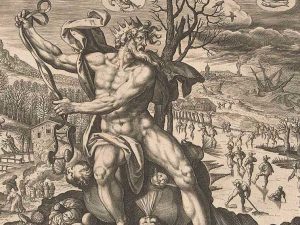
Amazons: women warriors, who allowed no men to live among them. They killed the male infants born to them. Some stories claim that they cut off one breast in order to be able to fight more effectively.
Ambrosia: derived from the Greek for “immortal.” The food of the gods. It along with nectar conferred immortality and prevented wear and tear on the body.
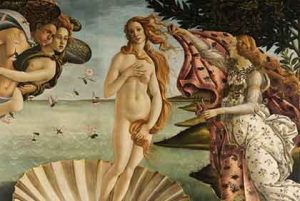
Another account makes Uranus her father and has her rising from the foam of the sea and being wafted first toward the island of Cythera (thus she is sometimes referred to as Cythera) and then to Cyprus, where she stepped out upon the beach.
Here the Seasons met her, and clothing her in wonderful raiment fit only for the gods and adorning her with jewels, took her to the great palace on Mt. Olympus where they introduced her to the other Olympians.
She symbolized love between men and women and the force that reproduces life. Her worship was universal and her altars heaped with roses. Especially popular in Corinth and as mother of Harmonia, she was the patron of Thebes. Patron of prostitutes. Symbols: myrtle, dove
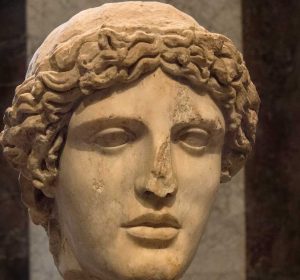
Known also as the god of purification, poetry, and truth, he represents the Greek spirit at its best. He possessed the silver, the Archer-god, far-shooting. Greeks also made him the sun god (Phoebus Apollo = pure, holy, pure light), a replacement for Helios.
Although the god of healing, the Greeks usually preferred to believe his son, Asclepius (Aesculapius, Asklepios), to be the god of medicine and Hygeia to be the goddess of preventive medicine, good health habits.. His oracle was at Delphi, where he killed Python.
Delphi inscriptions reflecting Greek values included “Nothing in excess” and “Know thyself.” Pythian Games dedicated to him. God of Truth; no false word ever fell from his lips. Symbols: chariot, crow, lyre, laurel, omphalos representing the naval of the world (half-egg or belly-button), dolphin
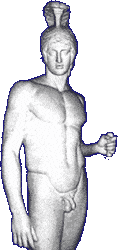
Ruthless in combat, he was in truth a whining coward who fled when he was wounded. His sister Eris, accompanied him on some of his trips to the battlefield along with her son, Strife. Also attended by Enyo, goddess of battle and waster of cities, Terror, Panic and Trembling.
The vulture and the wolf who cleared the bloody carcasses from the fields in the aftermath of battle were his sacred animals. Other symbols: dog, armor.
Artemis:
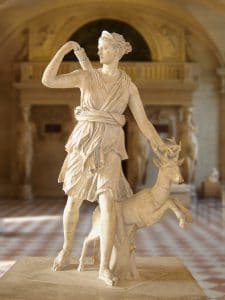
Also identified as Hecate. Unapproachable, she was known to kill men who showed their admiration for her. According to one legend, she unleashed a deadly scorpion on Orion, a hunting companion, after he touched her hand.
Although a hunter herself, she was also the friend and protector of the wild animals and avenged any wrong done to them. She exercised special care over girls and served as their guide and protector.
When it was time for them to marry and put away childish things, they brought their dolls to Artemis’s altar and left them there as a gift for the gracious goddess who had shown them so many kindnesses. Protectress of young creatures and thus of childbirth (goes back to causing Leto no pain when she was born). But also goddess of chastity.
Her most famous temple, one of the Seven Wonders of Ancient World, was at Ephesus on the Ionian coast of western Anatolia. One of the three virgin goddesses of Olympus. Symbols: hunting weapons, stag (deer), crescent, Cypress.
Asclepius (Asklepios):
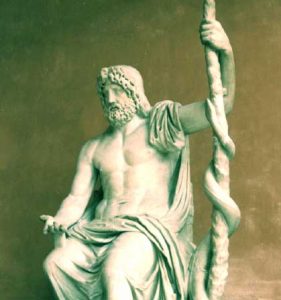
After Apollo (Artemis may has served as “hit person” for Apollo) killed Asklepios’s mother for being unfaithful, he successfully saved her unborn child.
Apollo then handed the infant over to Cheiron, the good Centaur, who then instructed Asklepios in medicine as he grew up. He became very proficient, but his zeal took him too far.
When Hippolytes died, Artemis asked him to resurrect her favorite. When she also offered a huge fee, Asklepios took the case and succeeded. However, this interfered with the established order of nature, and Zeus promptly sent the doctor to the underworld with a thunderbolt. Sanctuaries included Epidaurus, the first hospital in Europe. Symbol: snake usually entwined around a staff: caduceus.
Athena: 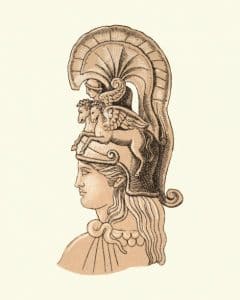
Born from the head of Zeus fully grown. Favorite child of Zeus. She was patron of Athens having bested Poseidon in a contest in which he offered the horse and she created the olive tree. The gods decided her gift was the most useful and named her the city’s protector.
She also cared for the arts of peace.
Through her men learned the arts of handicrafts and agriculture and she encouraged arts and letters. She became involved in war only it was being waged for righteous ends.
She concerned herself with the resourcefulness and skill which brought ultimate victory rather than the contests on the battlefield where strength and valor dominated.
One of the three virgin goddesses of Olympus. Her most famous temple was the Parthenon on the Athenian acropolis. Symbols: breastplate and aegis, owl, olive.
Atlas:
Titan who bore the world on his shoulders. Strongest Titan. Condemned by Zeus to hold up the sky eternally. Became Mt. Atlas in Libya. He was either a divinity having charge of the pillars which upheld the heavens, or a Titan forced, for warring against Zeus, to bear the heavens on his shoulders. In one story Perseus, with the head of Medusa, turned him into a rocky mountain for his inhospitality (the Atlas Mts. of N. Africa.)
Calliope:
One of the Muses, daughter of Mnemosyne and Zeus. Means “beautiful voice.” Eloquence. Muse of epic poetry and rhetoric. Carrying a wax tablet and stylus, Calliope inspired epic poetry and eloquent speech. Symbols: scroll, laurel crown, stylus, tablet.
Castor:
A famous tamer of horses, he had a twin brother named Pollux. When Castor died, Zeus was touched by Pollux’s great grief. He let the twins, together, divide their time evenly between Hades and heaven. In honor of these twins, Zeus created the constellation Gemini. The Dioscouri protected sailors. Also one of the twin tamers of horses.
Most famus names in Greek Mythology
- Achilles – Hero of the Trojan War.
- Aeolus – Keeper of the winds.
- Aphrodite – Goddess of love and beauty.
- Apollo – God of the sun, music, and prophecy.
- Ares – God of war.
- Artemis – Goddess of the hunt and moon.
- Athena – Goddess of wisdom and warfare.
- Atlas – Titan condemned to hold up the sky.
- Cerberus – Three-headed dog guarding the underworld.
- Charon – Ferryman of the dead.
- Chiron – The wisest of the centaurs.
- Cronus (or Kronos) – Titan and father of the Olympian gods.
- Danaë – Mother of Perseus by Zeus.
- Demeter – Goddess of agriculture.
- Dionysus – God of wine and festivities.
- Echo – Nymph known for repeating words.
- Elysium – Paradise where heroes and the virtuous were sent after death.
- Eris – Goddess of discord.
- Eros – God of love.
- Europa – Phoenician princess whom Zeus abducted in the form of a bull.
- Gaia (or Gaea) – Primordial deity of the Earth.
- Hades – God of the underworld.
- Hephaestus – God of fire and blacksmiths.
- Hera – Queen of the gods and goddess of marriage.
- Hermes – Messenger god.
- Hydra – Multi-headed water monster.
- Hyperion – Titan of light.
- Icarus – Flew too close to the sun with wax wings.
- Io – Maiden turned into a cow by Zeus.
- Iris – Goddess of the rainbow.
- Medusa – Gorgon with snake hair who turned viewers to stone.
- Morpheus – God of dreams.
- Narcissus – Youth who fell in love with his reflection.
- Nemesis – Goddess of retribution.
- Nike – Goddess of victory.
- Odysseus – Hero of the Odyssey.
- Pan – God of shepherds, known for his pan flute.
- Pandora – First woman, opened the forbidden box.
- Persephone – Queen of the underworld, abducted by Hades.
- Perseus – Hero who beheaded Medusa.
- Poseidon – God of the sea.
- Prometheus – Titan who gave fire to humanity.
- Rhea – Titaness and mother of the Olympian gods.
- Selene – Goddess of the moon.
- Sisyphus – Condemned to eternally roll a boulder uphill.
- Tantalus – Punished with eternal hunger and thirst in the underworld.
- Theseus – Hero who defeated the Minotaur.
- Typhon – Giant storm-spewing monster.
- Uranus – Primordial god of the sky.
- Zeus – King of the gods.
